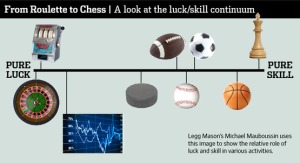Process vs Outcome
A lot of things in life are based on the concept of following the right process which ensures or is said to ensure the right outcome. Study hard parents say so that you can get into the best college – a direct relationship being there between marks scored and the fact that a high score shall get one into a top notch college.
A employee works hard hoping to claim his spot when a higher position opens up or to be able to claim a higher bonus. Again a direct relationship.
In the financial markets though, such a direct relationship is always difficult to establish. Buying a good company may decrease the probability of total loss of capital but never can guarantee a good return especially when its damm difficult to really say what is a good company and what is not. In 2007, I doubt if any Analyst openly said that Bear Stearns or Lehman were bad companies. After all, Lehman was a 150+ year old company that had survived through every crash and cycle that came about in those years. Bear Stearns was a 80+ year old company.
The thought for this blog came by this article – How we made nearly $1 million on Apple stock (Link).
The story is about how a couple bet (and not a big sum) on Apple and since they have sat on it for the last 16 years have now made a fortune (or sort of depending on what you call a fortune). Nice pleasing story especially since it deals with immigrants, their emphasis on buying a good company, etc, etc.
But is it a good lesson to learn for a ordinary investor? I guess not for not only does this story has its heuristic bias faults – Survivor Bias to start with but also the investors here did break major rules relating to investing. The fact that they came out good does not make the path something others should consider to the the path of the successful.
Lets start with the fact that even after overlooking things like Taxes, the guys have not made a Million (Realized + Un-realized). But since a Million bucks sounds nice, the copy editor maybe decided, this is how I attract more eyeballs.
Coming to the faults of the investment itself. The success is the outcome of breaking two golden rules of investment.
1. Never place all your eggs in a single basket. While the report does not detail whether they had invested in other shares as well, the gist seems to be that this is their only investment – Zero Diversification. In other words, they bet their money on a single stock and it turned out to be a great investment. If it had failed (as it has for hundreds of thousands of investors), they would have lost a small sum of money (that maybe not have been even significant enough to materially change their lives).
2. Not cutting one’s losses (Stop Loss). In the aftermath of the burst of the tech bubble in 2000, the stock of Apple fell by 65% and what did our savvy investors do? Nothing. The stock fell by 61% in 2008 / 09 and once again, our investors stayed put.
This also reminds me of a the following conversation between Barry Ritholtz and James O’Shaughnessy in Bloomberg Radio’s “Masters In Business” programme.
“O’Shaughnessy: “Fidelity had done a study as to which accounts had done the best at Fidelity. And what they found was…”
Ritholtz: “They were dead.”
O’Shaughnessy: “…No, that’s close though! They were the accounts people who forgot they had an account at Fidelity.”
So, is the moral of the story being not to act and hope that the stock will eventually bounce back? I say, lack of exit strategy is one of the biggest reasons that dud shares have only retail investors as their majority investors (even the promoters bail out after a certain period of time).
Is then Buying and Forgetting the right way to deal with the volatility that comes with investments? My limited experience in markets tells me that, this cannot be true. Yes, there will be occasional stories of such success, but then again, who would want to write a story about a guy who was disciplined enough to stay with a great company that just managed to go under when the economy tumbled.
Similar stories can be read about Entrepreneurs as well. The story generally starts with how the guy started out in a Garage and now has build his company to the current multi million / billion level. What is left unsaid that 9 out of 10 ventures fail.
Luck plays a great deal in a lot of our ventures including investments in the market. The following picture by Michael Mauboussin shows the same pretty nicely.
Hind-sight is always 20/20. While much of the world looks at the results, to me, the process is as much important too.
In the field of investment, if you do not have a process, the outcome will generally be one of failure unless you are that 1 in a Million who got Lucky 🙂



Recent Comments